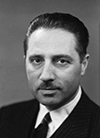Guillaume Guindey
( central banker) | ||||||||||||||
|---|---|---|---|---|---|---|---|---|---|---|---|---|---|---|
 | ||||||||||||||
| Born | 19 June 1909 Évreux, Eure, France | |||||||||||||
| Died | 11 March 1989 (Age 79) | |||||||||||||
| Nationality | French | |||||||||||||
| Alma mater | • l'École normale supérieure • Sciences Po | |||||||||||||
| Interests | Marshall Plan | |||||||||||||
| Relatives | Anatole Guindey | |||||||||||||
Quad Bilderberg BIS General Manager. Marshall Plan. Advised General de Gaulle to repatriate the French gold reserve from the United States.
| ||||||||||||||
Guillaume Guindey was a French central banker who was director of the Bank for International Settlements and attended the Bilderberg 4 times.
An influential economist, he was, with Jacques Rueff, one of the inspirers of General de Gaulle's international monetary policy in the 1960s: repatriation of France's gold foreign exchange reserves and questioning of the particular role of the United States in the gold exchange standard system.
Background
Guillaume Guindey was born in 1909 in Évreux in a family of notables. His father, Claude Guindey, was sub-prefect; his grandfather, Anatole Guindey, was senator and mayor of Evreux. Guillaume Guindey lost his father very young, who died as an officer in battle during the first phase of the First World War in September 1914.[1] After the death of his father, he was raised in his mother's family, at the castle of Trangis[2].
A brilliant student[3], he was admitted in 1927 to the École normale supérieure after only one year of literary preparatory classes. He had been close to Simone Weil since the age of 5. He later engaged with her in favor of the disadvantaged, in particular by giving classes in working class areas.[4]
He will remain marked by the teaching of Émile Chartier, but does not belong to the first circle of "chartierists". He anticipates the call by performing his military service in 1929 and prepares at the Free School of Political sciences for the competition of the General Inspectorate of Finance where he is accepted in 1932.[5]
Senior official career
The day after the 1938 Munich Agreement, he, like Raymond Aron, his slightly older brother, judged that war was inevitable and believed that pacifism could not be an answer to the challenges of the time. He publicly expresses his hostility to the armistice and maintains difficult relations with the Vichy government until his departure for Algiers, under a false name, immediately after the Allied landing in 1942. He was put in charge by General de Gaulle's provisional government of international issues within the Commissariat of finance.
Crowned with the prestige acquired in Algiers, he was in charge of external finances at the Liberation, then he took over in 1946 as head of the brand new external finance directorate (FINEX) whose mission was to restore France's financial credibility internationally. He participated in the negotiations for the Marshall Plan. He remained in this position until 1953[6], when he resigned, due to a disagreement with Antoine Pinay, Minister of the Economy, who did not support his proposal for monetary devaluation.
For Guindey, France must join the movement of trade liberalization. Liberal and pragmatic, Guindey is according to Michel Margairaz the central figure of the group of the Austero-liberals[7] group of senior officials. "We were guided by the idea that the liberation of trade, competition, the opening of borders, were essential to the aeration of the French economy, which had been stifled for too long" Guillaume Guindey would later Say.[8]
An influential economist, he was, with Jacques Rueff, one of the inspirers of General de Gaulle's international monetary policy: repatriation of France's gold foreign exchange reserves and questioning of the particular role of the United States in the gold exchange standard system (orientations summarized in General de Gaulle's press conference of February 4, 1965).[9]
Between 1958 and 1973, he was managing director of the Bank for International Settlements in Basel, the central bank of central banks.
Between 1972 and 1979, he chaired the financial company for the expansion of telecommunications.
Events Participated in
| Event | Start | End | Location(s) | Description |
|---|---|---|---|---|
| Bilderberg/1961 | 21 April 1961 | 23 April 1961 | Canada Quebec St-Castin | The 10th Bilderberg, the first in Canada and the 2nd outside Europe. |
| Bilderberg/1962 | 18 May 1962 | 20 May 1962 | Sweden Saltsjöbaden | The 11th Bilderberg meeting and the first one in Sweden. |
| Bilderberg/1963 | 29 March 1963 | 31 March 1963 | France Cannes Hotel Martinez | The 12th Bilderberg meeting and the second one in France. |
| Bilderberg/1974 | 19 April 1974 | 21 April 1974 | France Hotel Mont d' Arbois Megève | The 23rd Bilderberg, held in France |
References
- ↑ Visionneuse - Mémoire des Hommes
- ↑ https://archive.wikiwix.com/cache/?url=https%3A%2F%2Fwww.paris-normandie.fr%2Fhemerotheque%2Fune-destinee-sociale-pour-le-chateau-de-trangis-a-evreux-1033890-CYPN1033890
- ↑ Revue des deux mondes, 1976 archived
- ↑ Florence de Lussy , Simone Weil : « Que sais-je ?» no 4037, Presses Universitaires de France, 5 octobre 2016
- ↑ Jean-François Sirinelli, Génération intellectuelle : Khâgneux et Normaliens dans l'entre-deux-guerres, Fayard, 1er avril 2014, 722 p. ISBN 978-2-213-65368-6
- ↑ Solenne Lepage, La direction des finances extérieures face à la modernisation et à la nécessité de restaurer la puissance internationale de la France (1946-1950, Histoire, économie & société, vol. 18, no 2, 1999, p. 255–274
- ↑ Laure Quennouëlle-Corre, La direction du Trésor 1947-1967 : L’État-banquier et la croissance, Institut de la gestion publique et du développement économique, 29 mars 2013, 693 p. ISBN 978-2-8218-2858-2
- ↑ Jérôme Wilson, Robert Triffin – Milieux académiques et cénacles économiques internationaux (1935-1951), Versant Sud, 5 octobre 2015 ISBN 978-2-930358-67-3
- ↑ Laure Quennouëlle-Corre, "Chapitre X. 1965-1967, la marche forcée vers la modernisation ", dans La direction du Trésor 1947-1967, Institut de la gestion publique et du développement économique (ISBN 978-2-11-091054-7 p. 552-554
Wikipedia is not affiliated with Wikispooks. Original page source here